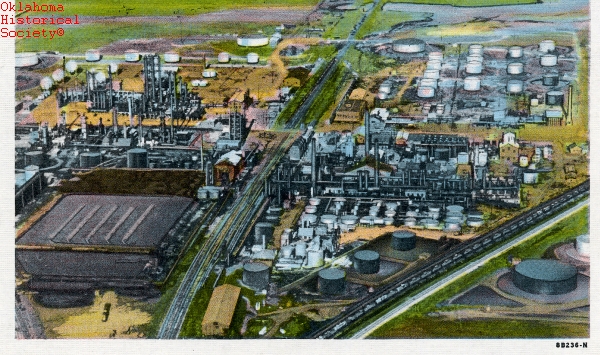The Encyclopedia of Oklahoma History and Culture
CHAMPLIN REFINING COMPANY.
The Champlin Refining Company, which for many years held the distinction of being the nation's largest fully integrated oil company under private ownership, was based at Enid, Oklahoma. In 1916 Enid banker and entrepreneur Herbert Hiram Champlin (1868–1944) bought a lapsed oil lease on the Beggs farm in the fledgling Garber Field about fifteen miles east of Enid. Champlin was reluctant to enter the new and highly speculative oil business, but at his wife's urging he agreed to invest twenty-five thousand dollars in the venture.
Champlin's first well came in on Christmas Day 1916 as a 250-barrel producer. The banker-turned-oilman drilled more wells on his 160-acre lease and in July 1917 purchased a small refinery on the outskirts of Enid, enlarged it to provide a market for the oil from his wells, and established the Champlin Refining Company. In order to provide a secure market for the refinery's growing output, He purchased a series of small oil companies that operated service stations. By the mid-1920s Champlin Refining Company was marketing petroleum products in a six-state area centered on Oklahoma. As the organization grew, it drilled more wells, built a large pipeline network, opened additional refineries, and greatly expanded the retail operation, all under the auspices of Champlin's private ownership.
When Herbert H. Champlin died on April 30, 1944, his company employed more than eight hundred people in Enid, operated service stations and wholesale outlets in twenty midwestern states, had a strong drilling and production presence in Oklahoma, Texas, Colorado, and New Mexico, and continued a major refining operation supported by one of the largest pipeline complexes in Oklahoma. The company continued under family ownership until its stock went public in 1953. In 1954 the Champlin Refining Company was bought by the Chicago Corporation of Chicago, Illinois. This $55 million deal allowed the company to operate as a subsidiary until the Chicago Corporation changed its name to the Champlin Refining Company in 1956. In 1964 the Celanese Corporation bought the company, and at the beginning of 1970 Celanese sold Champlin to the Union Pacific Resources Company, a division of the Union Pacific Corporation. They operated the Champlin Refining Company in much the same manner as before. In 1984 they sold the entire retail operation to American Petrofina, closed the Enid refinery, and ended the Champlin Refining Company's lengthy and significant presence in Oklahoma.
See Also
Bibliography
Henry B. Bass, "Herbert Hiram Champlin," The Chronicles of Oklahoma 33 (Spring 1955).
Daily Oklahoman (Oklahoma City), 10 June 1923, 11 March and 29 August 1984.
Stella Campbell Rockwell, ed., Garfield County, Oklahoma, 1893–1982, 2 vols. ([Enid, Okla.]: Garfield County Historical Society, 1982).
Citation
The following (as per The Chicago Manual of Style, 17th edition) is the preferred citation for articles:
Bobby D. Weaver, “Champlin Refining Company,” The Encyclopedia of Oklahoma History and Culture, https://www.okhistory.org/publications/enc/entry?entry=CH001.
Published January 15, 2010
© Oklahoma Historical Society



